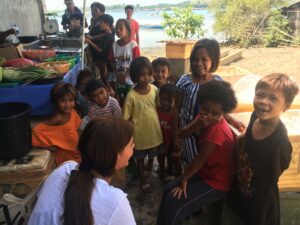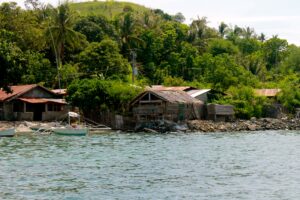The Philippines: Struggle and Resilience
January 22, 2022
T he idea of ‘Filipino Resilience’ has long been touted as something for the Philippines, and for citizens of the country, to be proud of. And maybe it is. The Philippines has a history of enduring and bouncing back from hardships; from dictatorship, to colonization, enduring natural disaster after natural disaster. Filipino citizens are not strangers to struggle, and the stereotype upon them is that they have learned how to thrive in the face of poor conditions. Yet many in the Philippines dislike this term, as they feel it romanticizes the nation’s struggles, while doing little to alleviate them. And perhaps they’re right; Filipinos have been asked to be resilient a few too many times. Unfortunately, 2021 was no different. Without a doubt, the Philippines is facing a challenge both to the country and to its people – with or without their ‘Filipino Resilience,’ the citizens of this wounded country are in desperate need of support.
he idea of ‘Filipino Resilience’ has long been touted as something for the Philippines, and for citizens of the country, to be proud of. And maybe it is. The Philippines has a history of enduring and bouncing back from hardships; from dictatorship, to colonization, enduring natural disaster after natural disaster. Filipino citizens are not strangers to struggle, and the stereotype upon them is that they have learned how to thrive in the face of poor conditions. Yet many in the Philippines dislike this term, as they feel it romanticizes the nation’s struggles, while doing little to alleviate them. And perhaps they’re right; Filipinos have been asked to be resilient a few too many times. Unfortunately, 2021 was no different. Without a doubt, the Philippines is facing a challenge both to the country and to its people – with or without their ‘Filipino Resilience,’ the citizens of this wounded country are in desperate need of support.
While Bohol has almost completely recovered from the catastrophic 2013 earthquake that sparked Wisconsin Microfinance’s involvement in the Philippines, it continues to be pummeled by typhoons, earthquakes, and other tropical storms. Most recently, in December of 2021, Typhoon Rai struck Bohol with torrential rains and winds up to 168 miles per hour, comparable to a Category 5 hurricane. It blew away buildings, forced people from their homes, and cut off communication.
These events have led to many businesses closing as well as a significant drop in tourism, a major driver of the Filipino economy. Countless Filipinos have lost their jobs, and for some families, their only source of income. As if this wasn’t enough, the Philippines has also been negatively impacted by something that is on all of our minds: COVID-19.
With over 3.3 million cases, COVID-19 is at an all time high in the Philippines. Each day, the number of cases sets new records, and lock-downs continue to be required. While roughly half of the population is fully vaccinated, the unvaccinated population is disproportionately poor and from rural areas. Additionally, hospitals are reaching capacity, and pharmacies are running out of drugs to treat COVID symptoms.
In response, many international humanitarian organizations have provided aid – medicine, food and gasoline. But this aid doesn’t help Filipinos start over and rebuild their livelihoods; that’s a much more difficult task that requires the incredible powers of microfinance. Your donation to Wisconsin Microfinance provides capital to an aspiring entrepreneur in the Philippines who will use her loan to lift herself, her family, and her entire community out of poverty.

There’s no denying that Filipinos are resilient. But even resiliency needs a little help. Please support an entrepreneur by donating at https://wisconsinmicrofinance.com/take-action/donate/.
Author: Jahnvi Datta
Sources:
https://www.shopcambio.co/blogs/news/what-if-there-s-a-better-way-to-talk-about-filipino-resilience
https://www.nytimes.com/2022/01/17/world/asia/philippines-covid-surge-omicron.html
https://www.reuters.com/markets/asia/pandemic-pushes-millions-philippines-into-poverty-2021-12-17/